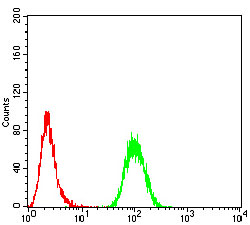Product Detail
Product NameSK2 Antibody
Clone No.E1-C5
Host SpeciesMouse
ClonalityMonoclonal
PurificationProA affinity purified
ApplicationsICC, IHC, FC
Species ReactivityHu
Immunogen DescRecombinant protein
ConjugateUnconjugated
Other Names3 prime phosphoadenosine 5 prime phosphosulfate synthase 2 antibody
3' phosphoadenosine 5' phosphosulfate synthase 2 antibody
ATP sulfurylase/adenosine 5' phosphosulfate kinase antibody
ATP SULFURYLASE/ADENOSINE 5-PRIME PHOSPHOSULFATE KINASE 2 antibody
ATP sulfurylase/APS kinase 2 antibody
ATPSK2 antibody
Bifunctional 3' phosphoadenosine 5' phosphosulfate synthase 2 antibody
Bifunctional 3' phosphoadenosine 5' phosphosulfate synthethase 2 antibody
PAPS synthase 2 antibody
PAPS synthetase 2 antibody
PAPSS 2 antibody
PHOSPHOADENOSINE-PHOSPHOSULFATE SYNTHETASE 2 antibody
SK 2 antibody
SK2 antibody
Sulfurylase kinase 2 antibody
Accession NoSwiss-Prot#:Q9NRA0
Uniprot
Q9NRA0
Gene ID
56848;
Calculated MW69 kDa
Formulation1*TBS (pH7.4), 1%BSA, 40%Glycerol. Preservative: 0.05% Sodium Azide.
StorageStore at -20˚C
Application Details
IHC: 1:200-1:1000
ICC: 1:200-1:1000
FC: 1:50-1:100
Immunohistochemical analysis of paraffin-embedded human bladder cancer tissue using anti- SPHK2 antibody. Counter stained with hematoxylin.
Immunohistochemical analysis of paraffin-embedded human endometrial cancer tissue using anti- SPHK2 antibody. Counter stained with hematoxylin.
ICC staining SPHK2 (green) and Actin filaments (red) in Hela cells. The nuclear counter stain is DAPI (blue). Cells were fixed in paraformaldehyde, permeabilised with 0.25% Triton X100/PBS.
Flow cytometric analysis of Hela cells with SPHK2 antibody at 1/100 dilution (green) compared with an unlabelled control (cells without incubation with primary antibody; red).
This gene encodes one of two sphingosine kinase isozymes that catalyze the phosphorylation of sphingosine into sphingosine 1-phosphate. Sphingosine 1-phosphate mediates many cellular processes including migration, proliferation and apoptosis, and also plays a role in several types of cancer by promoting angiogenesis and tumorigenesis. The encoded protein may play a role in breast cancer proliferation and chemoresistance. Alternatively spliced transcript variants encoding multiple isoforms have been observed for this gene.
If you have published an article using product 48406, please notify us so that we can cite your literature.






 Yes
Yes



